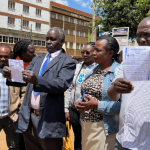Senators have been briefed on the worsening transparency and accountability issues in municipal and county hospitals across the nation. Auditor General Nancy Gathungu highlighted significant concerns about the lack of accountability in these facilities.
“Only 46 out of 110 municipalities had submitted financial statements for audit by June 2023,” Gathungu told the Senate County Public Investments and Special Funds Committee on Wednesday.
She identified several common problems, including non-submission of financial statements, reporting errors, failure to adhere to reporting standards, procurement violations, and lack of integrated development plans.
Gathungu also criticized county hospitals for their failure to submit financial statements for auditing. She reported that 193, or 54 percent, of Level 4 hospitals had not submitted financial statements for the 2021-22 financial year, and 163, or 46 percent, had not submitted statements for the 2022-23 financial year.
“Additionally, only 33 counties have submitted at least one financial statement for their hospitals for the financial years 2021-22 and 2022-23,” Gathungu said in her report.
County governments are responsible for managing hospitals within their jurisdictions, including Community Facilities (Level One), Health Dispensaries (Level Two), Health Centres (Level Three), County Hospitals (Level Four), and County Referral Hospitals (Level Five). According to the Kenya Master Health Facility list by the Ministry of Health, there are a total of 358 Level Four hospitals and 14 Level Five hospitals in the country.
This week, the committee led by Godfrey Osotsi also met with Kilifi County Governor Gideon Mung’aro and Kwale County Governor Fatuma Achani. Mung’aro appeared before the committee to address audit queries related to the Kilifi Health Services Fund and the municipalities of Malindi and Kilifi for the fiscal years 2019-20 to 2022-23. The committee granted Governor Mung’aro additional time to prepare responses to the audit reports of the municipalities.
Regarding the Kilifi Health Services Improvement Fund, Osotsi stressed that the governor must ensure the accounting officer provides all necessary documents during the audit process.
Governor Fatuma Achani appeared before the committee to address the financial statements of several hospitals, including Msambweni, Lunga Lunga, and Kinango, for the fiscal years 2021-22 and 2022-23. The committee identified various management and financial challenges across these hospitals and issued directives to improve their financial performance.
Kisumu Senator Tom Ojienda emphasized the role of automation in enhancing accountability and efficiency, stating, “Automation is essential for accountability and efficiency in our healthcare system.” Both governors were instructed to implement internal control policies and strengthen budgetary control measures.
In a related development, the Public Investments Committee on Governance and Education of the National Assembly, chaired by Bumula MP Jack Wamboka, warned institutions of higher learning about the risk of penalties for audit rule violations. The committee expressed concerns over recurring breaches by institutions and had reviewed reports from Maasai Mara Technical and Vocational College and Tharaka University College.
They cautioned the heads of these institutions about delayed submissions of documents for audit and stressed the importance of adhering to the audit cycle.
Additionally, the Independent Electoral and Boundaries Commission (IEBC) proposed that impeachment cases involving governors be resolved within six months. Speaking before the Senate Committee on Justice, Legal Affairs, and Human Rights, Ruth Kavuo from IEBC’s legal department suggested that a set timeline would ensure that courts address such cases promptly.
“Once you lock the timeline, it means that the courts have a period within which if they do not deal with the matter conclusively, then the governor will be declared not fit to hold office,” Kavuo said.


